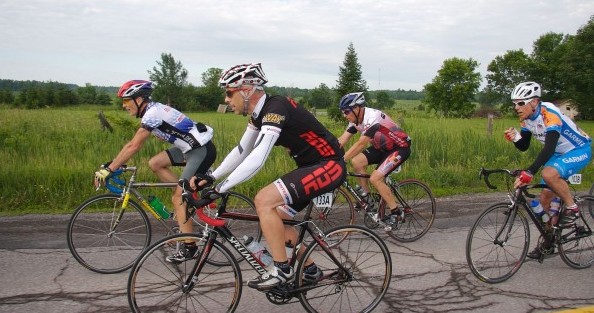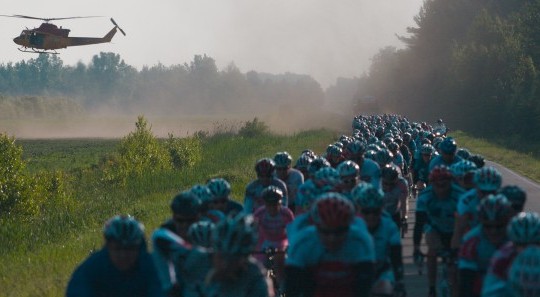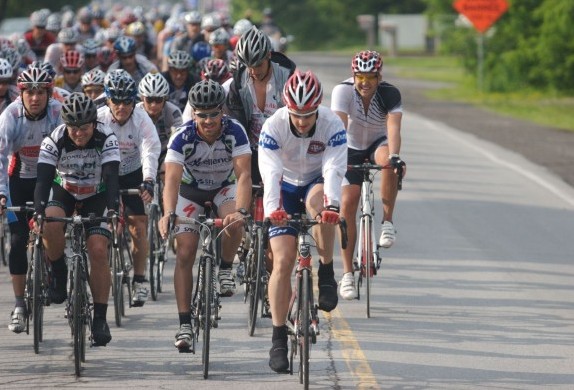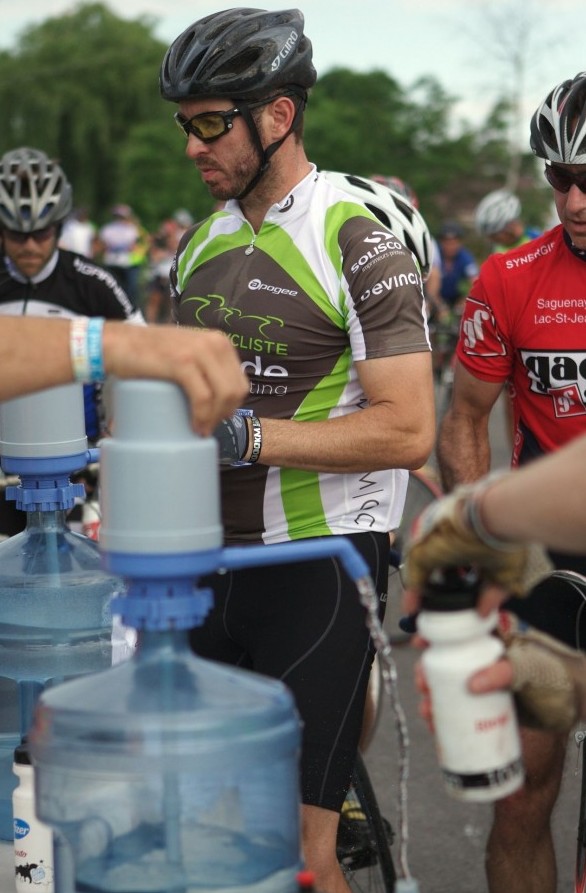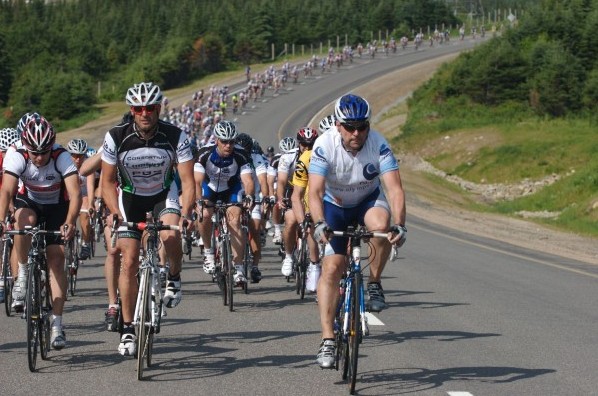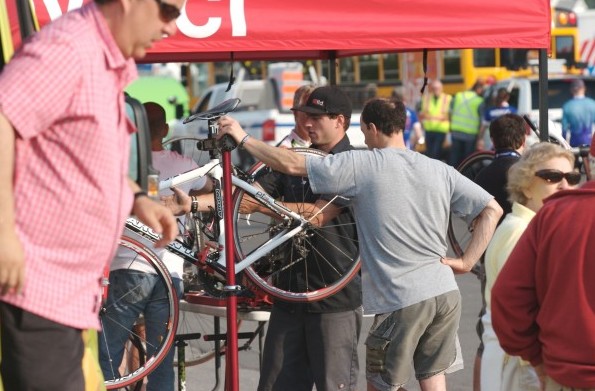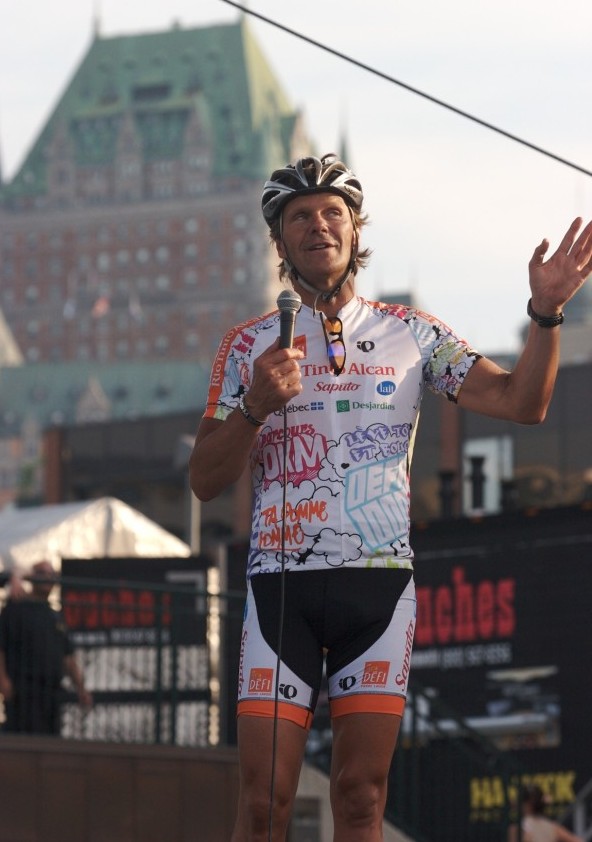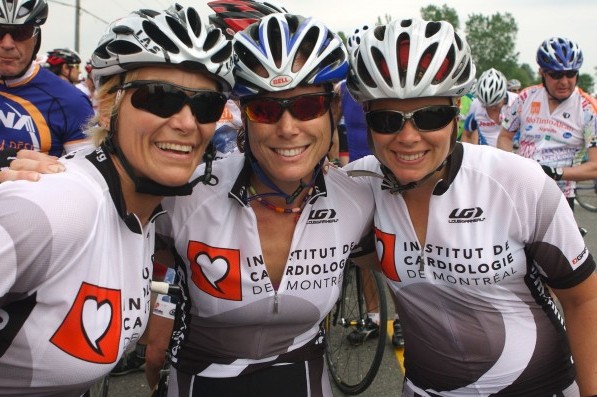-
2026 Conditions
First Condition
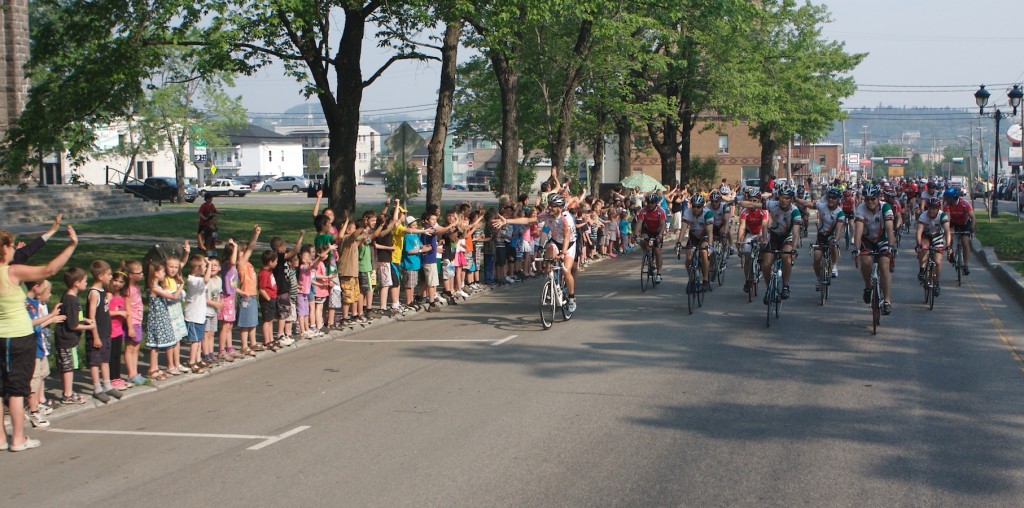 Pierre suggests that you include in your cycling team someone who is more sedentary but has decided to make a healthy change and wants to improve their lifestyle. This person is important to your team. You need to mentor, support, and train them so that they are ready on D-day, i.e., the day of departure.
Pierre suggests that you include in your cycling team someone who is more sedentary but has decided to make a healthy change and wants to improve their lifestyle. This person is important to your team. You need to mentor, support, and train them so that they are ready on D-day, i.e., the day of departure.Second Condition
This condition is mandatory for all teams registered in 2026. Each team must choose one of the three elements of the sponsorship program aimed at carrying out projects that promote healthy lifestyles among young people. The first option is to contribute directly to the Grand défi Pierre Lavoie projects. It is also possible to support the Fondation du Grand défi Pierre Lavoie by supporting research on rare hereditary diseases and healthy lifestyles among young people.
The third option is to sponsor one or more elementary schools. If you choose this option, you must ensure that your school registers for the Energy Cubes Challenge in May and accumulates a significant number of energy cubes. We believe this is an original way to connect you, the cyclists, with the young people who are working so hard in May. You must also get as involved as possible with this school in various ways. For example, by giving a speech to explain to the children your motivations for taking on such a challenge. The goal is obviously to raise awareness among 6- to 12-year-olds about healthy lifestyles and, who knows, maybe even inspire them to ride The 1,000 KM themselves one day!
From a financial standpoint, all donations exceeding the $13,500 registration fee are allocated to the sponsorship program you have chosen. In the case of school sponsorship, the selected school must then submit a project promoting healthy lifestyles in order to access the surplus funds. The surplus will be awarded upon approval of the project by the Grand défi Pierre Lavoie.
Pierre Lavoie will no longer be the sole spokesperson for the Grand défi among Quebec schoolchildren. He will have an army behind him to bring about real change in the preventative health culture.
-
Identification
A chip system will be used for the 2026 edition. When they pass under the start and finish arches, cyclists will be logged by a custom chip system installed on each bike. This allows us to verify the maximum number of riders per team in the pack during each stage.
The system will also provide relevant statistics for each cyclist, such as time and kilometres traveled.
-
Packing List
The list of items that will potentially be useful to you during the 1000 KM will be communicated to you later. -
Number of Cyclists per stage
Two cyclists per team are allowed during the daytime stages. However, there can be only one cyclist per team in the pack during the night stages. During the “hybrid” stages that begin during the day and end at night, two cyclists per team are allowed. Be sure to consult the hours of each stage to know how many cyclists you can have in the pack.
Download the Excel spreadsheet (to come) that your team can use to plan and assign members to each stage. This spreadsheet’s layout lets you plan and visualize each member’s cycling distance.
-
Cycling Mentors
Safety is a must. We therefore need the help of the most experienced cyclists to act as cycling mentors. We need about twenty (20) mentors per stage to form an ideal pack. Unlike a race, the pack in The 1000 KM of the Grand défi Pierre Lavoie has a full range of cyclists: the weaker cyclists are at the front and the strongest at the back. Our mentors must be seasoned cyclists who are very good at teaching cycling techniques, as they give guidance to other participants. They sweep the pack and, if necessary, accompany individual cyclists in difficulty to bring them back to the front.
If you are interested in registering as a cycling mentor, be sure to select this option on the registration form.
Those who accept this role will be clearly identified and will help the organization make sure everything runs as smoothly as possible from start to finish by providing guidance and ensuring safety. This role is on a voluntary basis and is crucial to the success of The 1000 KM. It is not mandatory that your team have a member with sufficient experience to qualify as a mentor.
A cycling mentor is one who:
- Regularly rides in a pack or alone.
- Covers about 5,000 km per season.
- Has experience in competitive cycling, road cycling, mountain biking or triathlon.
- Is able to explain important cycling concepts and be an ambassador with cyclists who have difficulties.
-
Refreshments
The length of each stage varies between 20 and 135 km. You can choose the order in which your team members take over at each stage, so everyone can ride several stages of the 1000 KM. At every stop, there will be water, thirst-quenching drinks, coffee and snacks (fruit, cheese, chocolate milk, etc.). For stages longer than 70 km, there will be a refreshment stop midway, with water and thirst-quenching drinks. These stops will be 7 minutes in length.
-
Night stages
Some stages of the 2026 edition of the 1000 KM will be completed at night. A supplementary lighting system will be provided to enable cyclists to ride safely at night.
It is high-performance lighting that will be used by individual cyclists traveling at night. Only one cyclist per team will be allowed to ride at night.
-
Level of Difficulty of Stages
The level of difficulty of each stage is determined based on speed, elevation gain and distance. We define three levels of difficulty for the 1000 KM:
- Regular: Mostly flat and long stage, with a height difference of less than 300 meters. The distance is less than 75 km. The speed of the peloton is 24 km/h and less.
- Intermediate: Stage with some valleys and a difference in altitude between 300 and 650 meters, covering between 75 and 95 km. The speed is between 24 and 26 km/h.
- Advanced: Generally mountainous stage, with an elevation gain of between 650 and 800 meters, and a distance of 96 to 135 km. The speed is between 26 and 28 km/h.
- Expert: Very difficult stage of more than 135 km with an elevation gain of more than 800 meters. Only experienced cyclists in excellent physical condition should choose these stages. The speed of the peloton is 28 km/h and more.
For the first few minutes of each stage, the pack rides at a slower speed to warm up. For some portions of the stage, cyclists should therefore expect the speed to exceed the planned average for the entire stage.
Weather conditions will affect the speed of the pack. In adverse conditions, we will have to leave earlier than planned because our arrival time cannot be changed.
-
Flat tires
Cyclists with a flat tire will be swept up by the Mécano Bus operated by Grand défi. After the repair is completed, we will return the cyclist to the pack, but only when the convoy has come to a full stop (refreshment stop or a stop ordered by the police).
For the stage incorporating cyclists riding La Boucle, we suggest you be prepared to repair your flats yourself. Bring levers, a spare tube and an air cartridge or pump. You may otherwise have to wait a long time for mechanical assistance given the large number of cyclists during this stage.
Be sure that your tires are new and in good condition before starting the 1000 KM. We highly recommend that you use tires with tubes instead of going tubeless to facilitate repairing a flat.
All cyclists must check the pressure in both tires before each stage.
-
Mechanical Services
Cycle Néron will offer bike repair services at each stop. Cyclists must pay the cost of their replacement parts. Please note that some non-urgent services will not be offered, such as washing your bike, changing the handlebar tape and changing a tubeless tire.
Take your bike to your specialized bike shop for a check-up and maintenance during the weeks leading up to the 1000 KM to ensure it is in excellent condition before the event.
-
Medical, Ambulance, Physiotherapy and Massage Therapy Services
Physical therapy and massage therapy
Throughout the event, the Action Sport Physio team will provide physical therapy and massage therapy services to all cyclists participating in the 1000 KM. The team will be located in the Avril Village and will be available to assist you between each stage.
Medical services
For injuries that require the intervention of a nurse or doctor, a medical services team will be available on site at all times. They will be located in the red tent marked MEDICAL.
Ambulance services
Throughout the weekend, the Dessercom team will follow the convoy of cyclists along the route with an ambulance and a team of paramedics.
-
Exhibitors and Other Services
In addition to cycling services, the Village Avril public square brings together numerous exhibitors and food partners. This dynamic location in the heart of the village is becoming more than ever a place for people to meet and interact. All food services will offer their products free of charge from Thursday to Sunday.
-
Restrooms
Sanitary blocks, including showers and toilets, will be at your disposal in the Village Avril.
-
Cycling Jerseys
Grand défi Pierre Lavoie will provide you with a 1000 KM cycling jersey that you must wear during the last stage and at the finish line. You can wear a cycling jersey of your choice at any other time during the event.
Each cyclist should be sure to carefully check the sizing chart and indicate the size required in their cyclist information form. We will try to accommodate the cyclists who tell us their size after the deadline, but we cannot guarantee anything.
-
Personalized Cycling Jerseys and GDPL Logos
Since your bike jersey is probably the best way to give visibility to your sponsors, here are the contact details of various suppliers who can design custom jerseys for you.
If you wish to add the logo of Le Grand défi and/or the 1000km, here is the link to download them: Press room
Make sure to send us the model so that we approve the proper use of our logo at : 1000km@legdpl.com
Jakroo (by telephone : 450 578-5436)
-
Donations Made to Your Team and Tax Receipts
Cheques
ALL cheques must be made payable to: GO LE GRAND DÉFI INC.If, by mistake, one of your donors makes a cheque payable to Go le Grand défi inc. and to you, it is mandatory that you endorse the cheque before sending it to us.
Information requests
For all information requests, whether by email or voicemail, please provide your name, the name of your team in the 1000 KM, and the telephone numbers where we can reach you if necessary.Tax receipts
Go le Grand défi will issue receipts for donations over $25 only upon request and only for the full amount of the donation.The official tax receipts generated by our online donation site will be issued in the name of the donor indicated on the donation form; donor names cannot be changed once the receipt is generated. It is therefore very important to ensure that you enter the correct information when filling in the online donation form.
We cannot generate duplicates of receipts. It is up to you to safeguard the receipts sent to you.
Donors
Canada Revenue Agency rules are such that official donation receipts must be issued in the name of the actual donor, that is, in the name of the organization or person who made the donation.A tax receipt cannot be issued to a donation from an anonymous donor or from a fundraiser.
An online donation form must be completed for each donation.
When mailing your donation cheques to us, please accompany them with the name of the team and the name of the sponsored cyclist, if applicable.
For any other question concerning donations and tax receipts, please contact our finance and donations department at admin@legdpl.com.
.
